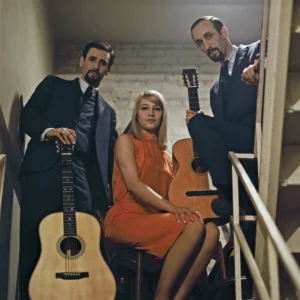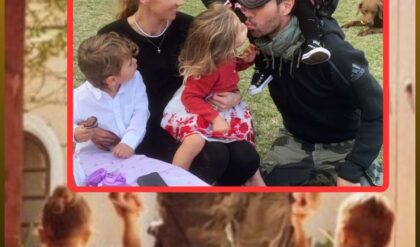The folk trio he formed with Noel Paul Stookey and Mary Travers became a pop phenomenon, scoring hits like “If I Had a Hammer” and “Puff the Magic Dragon.”
Peter Yarrow, whose caring and righteous vocals for the trio Peter, Paul and Mary helped establish them as one of the most popular folk acts of the 1960s, died on Tuesday at his home on the Upper West Side of Manhattan. He was 86.
His death was confirmed by Ken Sunshine, his publicist. Mr. Sunshine said the cause was bladder cancer, which Mr. Yarrow had been battling for the past four years.

On many of the trio’s recordings they split the vocal parts equally, braiding Mr. Yarrow’s precise tenor around Noel Paul Stookey’s gentle baritone and Mary Travers’s warm contralto. But Mr. Yarrow also had some prominent lead vocals as well, fronting such well-known group recordings as “Puff the Magic Dragon,” “Day Is Done” and “The Great Mandala,” all of which he either wrote or co-wrote. “Puff” became a No. 2 Billboard hit, while “Day Is Done” grazed the Top 20.
Mr. Yarrow wrote many other songs recorded by the group, often in collaboration with Mr. Stookey, the last surviving member of the group (Ms. Travers died in 2009 at 72).
In their peak years, Peter, Paul and Mary reached the Billboard Top 40 12 times; six of those songs made it onto the Top 10, including one, their cover of John Denver’s “Leavin’ on a Jet Plane,” that reached No. 1. They racked up five Billboard Top 10 albums and twice topped the magazine’s album chart.
Like many folk groups of the day, Peter, Paul and Mary were as well known for their progressive politics as for their music. In August 1963, they took part in the March on Washington, the site of the Rev. Dr. Martin Luther King Jr. “I Have a Dream” speech. Performing on the steps of the Lincoln Memorial, they sang Bob Dylan’s “Blowin’ in the Wind,” which they had turned into a Top Five Billboard hit that month; their Washington performance helped establish it as a civil rights anthem.
The trio also recorded songs and gave concerts supporting the liberal presidential candidates Eugene McCarthy in 1968 and George McGovern in 1972. Mr. Yarrow’s lyrics often emphasized the group’s political commitment: “The Great Mandala,” released in 1967, told the tale of a war protester on a hunger strike; “Day Is Done” (1969), addressed to his son, suggests that the coming generation might create a more just world.
“Day Is Done” and “Puff the Magic Dragon,” which both featured simple singalong choruses and willfully innocent points of view, doubled as children’s songs. Decades later, Mr. Yarrow turned each of them into an illustrated children’s book. “Puff” also inspired an animated TV special in 1978 that was popular enough to spawn two sequels.
Peter Yarrow was born on May 31, 1938, in Manhattan to Bernard and Vera (Burtakoff) Yarrow, Jewish immigrants from Ukraine. His father, a lawyer, was an assistant district attorney in New York under Thomas E. Dewey. He later became a vice president of the C.I.A.-funded organization Radio Free Europe.
Mr. Yarrow’s parents divorced when he was 5. His father later converted to Protestantism, but Mr. Yarrow considered Jewish teachings a major inspiration in his life.
He studied painting at the High School of Music and Art (now the Fiorello H. LaGuardia High School of Music & Art and Performing Arts) in Manhattan. During his college years at Cornell, he began singing and playing guitar after attending a course in American folk literature taught by the folklorist and historian Harold William Thompson.
After graduating, Mr. Yarrow moved to New York City and became a performer on the fruitful Greenwich Village folk scene. “I went with the idea that I want to be involved in music that creates community,” he told the music magazine Rebeat in 2015 — music, he added, “that reaches people’s hearts and mobilizes people for a more humane society.”
His success in the Village led to an invitation to appear on a CBS television special, “Folk Sound USA,” in 1960. It also earned him a chance to play the Newport Folk Festival, where he met Albert Grossman, a founder of the festival and the manager of the singer Odetta.
Mr. Grossman wanted to create a new group that would expand and update the formula of the Weavers, a folk harmony group consisting of a woman and three men (one of them Pete Seeger), which enjoyed significant success in the 1950s. He paired Mr. Yarrow with Ms. Travers, who had appeared in Village clubs and sung several times with Mr. Seeger. The duo became a trio when, at Ms. Travers’s suggestion, they added Noel Paul Stookey, with whom she had performed at a local club. Using Mr. Stookey’s middle name, they settled on their catchy biblical moniker.
The trio presented a compelling visual image: The two men, wearing dark ties, beatnik goatees and serious expressions, flanked Ms. Travers, whose blond hair framed noble cheekbones. Mr. Grossman booked them for a run at the Bitter End on Bleecker Street, and a buzz was created. In 1961, the group signed with Warner Bros. Records, which issued their debut album, called simply “Peter, Paul and Mary,” the following May.
Mr. Yarrow sang lead on the group’s first single, “Lemon Tree,” based on a Brazilian folk tune, which reached the Billboard Top 40. The full album rose to No. 1 after their second single, “If I Had a Hammer,” written by Pete Seeger and Lee Hays of the Weavers, became a Top 10 hit and won two Grammy Awards. The album stayed in the Top 20 for two years and sold more than two million copies.
The group’s follow-up, “Movin’,” released in early 1963, featured “Puff the Magic Dragon,” whose lyrics were based on a poem that a friend of Mr. Yarrow’s, Lenny Lipton, had written when he was 19, inspired by an earlier poem by Ogden Nash titled “The Tale of Custard the Dragon.” Speculation later arose that the song referred to smoking marijuana, an interpretation Mr. Yarrow strongly denied.
In June 1963, the trio released their cover of “Blowin’ in the Wind.” (Bob Dylan was another client of Mr. Grossman’s.) It sold an estimated 300,000 copies in its first week. By mid-August it had hit No. 2; it went on to sell more than a million copies. Their version of another Dylan song, “Don’t Think Twice, It’s All Right,” broke the Billboard Top 10, boosting the writer’s own album “The Freewheelin’ Bob Dylan” into the Top 30.
In 1964, Mr. Yarrow joined the board of the Newport Folk Festival. In 1970, he conceived the New Folks Concert at the Kerrville Folk Festival in Texas, which became an annual event. The year before, he had helped organize the National Mobilization to End the War, an anti-Vietnam War protest in Washington attended by an estimated half million people.
Peter, Paul and Mary had the biggest hit of their career in 1970 when “Leavin’ on a Jet Plane,” featuring Ms. Travers’s yearning contralto, reached No. 1. But mere months later, they announced their split.
They broke up in part to pursue solo careers, but also because Mr. Yarrow had been accused of making sexual advances toward a 14-year-old girl who had come to his dressing room with her 17-year-old sister seeking an autograph in 1969. He served three months of a one-to-three-year prison sentence after pleading guilty to taking “indecent liberties” with the girl.
In 1981, Mr. Yarrow received a presidential pardon from Jimmy Carter, though the case continued to be an issue for many years during election campaigns for politicians whom Mr. Yarrow supported.
In 2019, during the height of the #MeToo movement against sexual abuse of women, a scheduled performance by Mr. Yarrow at an upstate New York arts festival was canceled in response to protests. A remorseful Mr. Yarrow responded in a statement by saying that the organizers’ choice to exclude him was not “unfair or unjust.”
“I do not seek to minimize or excuse what I have done and I cannot adequately express my apologies and sorrow for the pain and injury I have caused,” he said in a statement to The New York Times.
In 1969, Mr. Yarrow married Marybeth McCarthy, a niece of the Democratic presidential candidate Eugene McCarthy. (Mr. Stookey wrote “Wedding Song,” which has since been performed in their honor at wedding ceremonies around the world.) The marriage ended in divorce, but they remarried in 2022. In addition to her, Mr. Yarrow is survived by a son, Christopher; a daughter, Bethany; and a granddaughter.
Mr. Yarrow released his first solo album, titled “Peter,” in 1972, but sales were tepid. He enjoyed far more success four years later with “Torn Between Two Lovers,” a song he wrote with Phillip Jarrell, which became a No. 1 hit for the middle-of-the-road pop singer Mary MacGregor.
Peter, Paul and Mary reunited for one-off benefit concerts in 1972 and 1978. After their second reunion, they began touring regularly, and they continued to perform until Ms. Travers’s death. In the years since, Mr. Yarrow and Mr. Stookey periodically performed together.
In a statement on Tuesday, Mr. Stookey called Mr. Yarrow his “creative, irrepressible, spontaneous and musical younger brother” but added that he also “grew to be grateful for, and to love, the mature-beyond-his-years wisdom and inspiring guidance he shared with me like an older brother.”
“Perhaps Peter was both of the brothers I never had,” Mr. Stookey said, “and I shall deeply miss both of him.”
In 2000, Mr. Yarrow helped start Operation Respect, a nonprofit organization dedicated to combating bullying and promoting tolerance among children.
Later in life, he often performed with his daughter and the cellist Rufus Cappadocia in a trio known as Peter, Bethany and Rufus. Their success reinforced Mr. Yarrow’s faith in his chosen genre.
“I believe folk music has had a positive effect on the decency, humanity and empathy of society,” he told Reuters in 2008. “Peter, Paul and Mary had a huge audience, some of whom did not agree with our politics. But they were touched by the human essence of our songs.”





